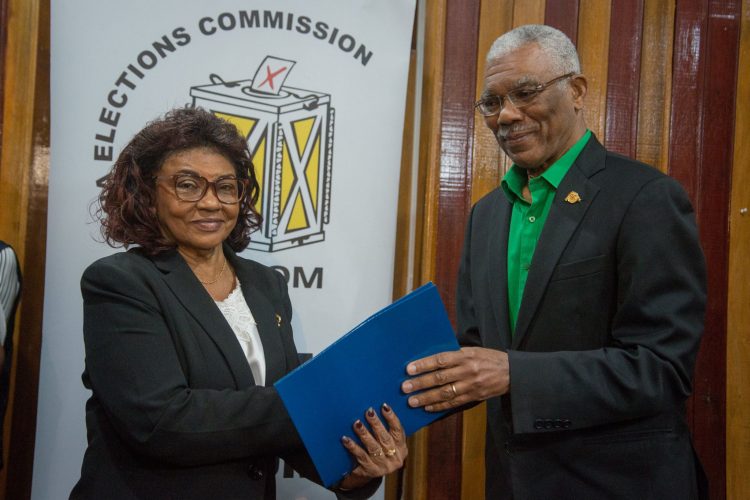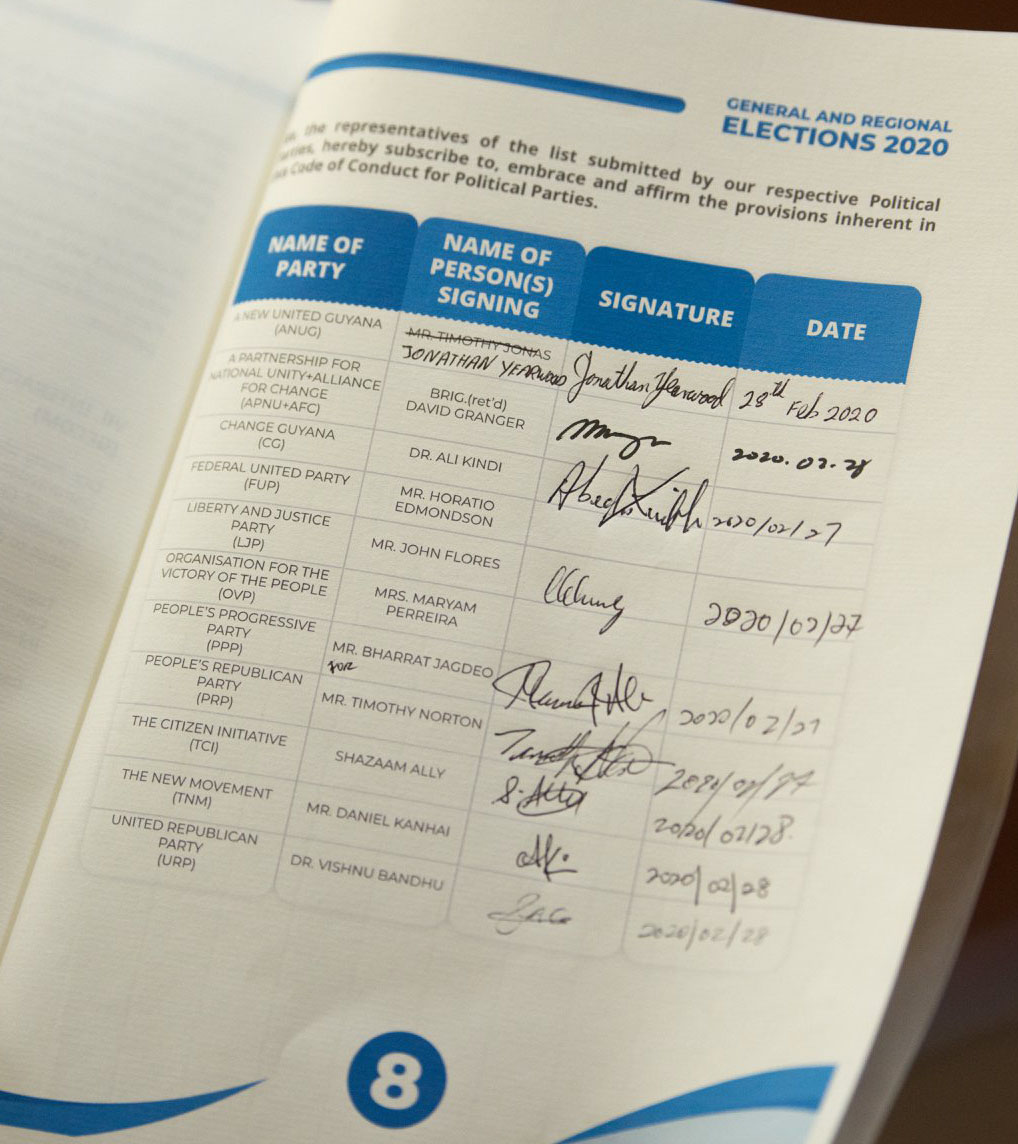Nine of the 11 political parties contesting Monday’s general and regional elections have signed on to a Guyana Elections Commis-sion (GECOM) Code of Conduct.
The code, according to GECOM Chair retired Justice Claudette Singh, will not only guide action on the one remaining day of the campaign but will also relate to behaviour on Election Day and the days following until the announcement of official results.
“It is refreshing to note that many of the political parties have readily consented to abide by the principles embodied in the code by their presence here this afternoon. I will urge all parties to adopt a responsible approach in an effort to ensure that…the days leading to elections…be free of hate speeches, incitement, and provocation, which may inevitably invoke emotions in an already charged atmosphere,” Singh told those gathered for the signing at GECOM’s Kingston headquarters.

President David Granger, who signed on behalf of the APNU+AFC coalition, commended the commission on crafting the code and committed the coalition to abiding by its terms.
PPP/C presidential candidate Irfaan Ali similarly committed his party to the “values of the code.”
He stressed that codes of conduct are a very important part of elections and committed his party not just to the values espoused in the code, but to free and fair elections which is also free from fear.
Representive for A New and United Guyana (ANUG) Jonathan Yearwood, while welcoming the code as very important, lamented that it was “extremely late in the game.”
“This should have been done probably two months ago…we knew elections were coming, everyone knew elections were coming, so this should’ve been done much earlier so that parties would’ve been abiding by it. As it [is], supporters of all political parties have been slinging mud left, right and centre and nobody has been checking them. Maybe if this had been out a lot earlier, it could’ve had an effect,” he said, adding that his party will abide by the code.
This is the second code the parties have signed. The first is being administered by the Ethnic Relations Commission (ERC) and it calls for politicians and their supporters to uphold Articles 38 (G), 146, 147, 149 and 160A of the Constitution. These articles prescribe that the public service shall be free from political influence, offer protection for freedom of expression, assembly, association and demonstration as well as offer protection from discrimination based on factors such as race and gender. Further, they prohibit political parties or their agents from causing ethnic division.
It also references the Racial Hostility Act and the Representation of the People Act, both of which also list prohibited activities before, during and after an election cycle.
GECOM’s code, which runs for six pages, makes similar requests.
Investigated
Additional clauses include a specific call for parties to pledge not to use “state machinery/vehicles/equipment/personnel/media for the furtherance of [their] Party’s interest.”
Yearwood immediately brought to the Chair’s attention that there have been public reports of one political party using state assets as part of their 2020 campaign.
Singh, however, said that these are allegations in need of investigation. “You have allegations? Allegations are not evidence so that would have to be investiaged by the commission,” she said.
Stabroek News had previously reported that the incumbent APNU+AFC has been using state assets including vehicles and the resources of the Department of Public Information (DPI) as part of its campaign. When this newspaper questioned Prime Minis-terial Candidate Khemraj Ramjattan about the use of these assets, he responded that this was part of the advantage of incumbency.
“I do not now have to use my private vehicle to go where I need to when campaigning. I use the ministry vehicle,” Ramjattan had said, stressing that for him, the line for abuse of state funds does not include transportation services. He also classified the use of DPI as “an advantage of incumbency.”
During yesterday’s signing, the commission was also asked about their expectations of political parties on Elections Day.
Specifically, Singh was asked to identify behaviours which could be cast as “canvassing”—an action which is specifically prohibited within 200 yards of a polling place.
Singh stressed that campaign materials, such as posters and flags and t-shirts with party slogans, will be prohibited but there is no guidline in relation to colours.
“I can’t tell somebody he must not wear a red shirt or a yellow shirt but I would expect the person to not be wearing slogans,” she explained. “Political parties should ask their supporters not to crowd the polling stations and not to be around…of course, stay their 200 [yards] away and the night, during the tabulation, they should not crowd the polling station,” she added.
Opposition-nominated commissioner Robeson Benn, who was present, took exception to the statement regarding colours, noting that the practice was for candidates and party agents to refrain from wearing party colours within the polling place.
“The tradition has been that on election day that practice is avoided. It would be unfortunate to deviate as it could lead to persons being targetted. It can also lead to situations where people feel intimidated in and around the polling station within the 200 yards,” he contended.
The code has been signed by ANUG, the APNU+AFC, Change Guyana, the Liberty and Justice Party, the PPP/C, the People’s Republican Party, the Citizenship Initiative, the New Movement and the United Republican Party.
According to Singh, the Federal United Party and Organisation for the Victory of the People, were not present because of late notice provided by GECOM.





